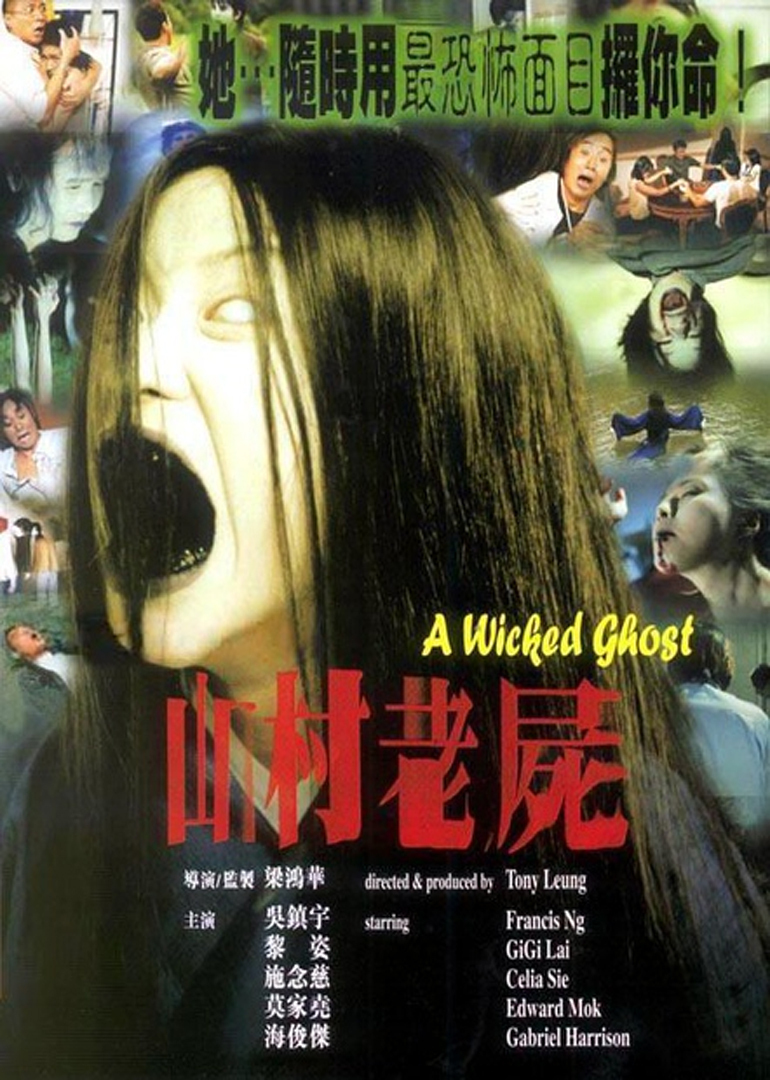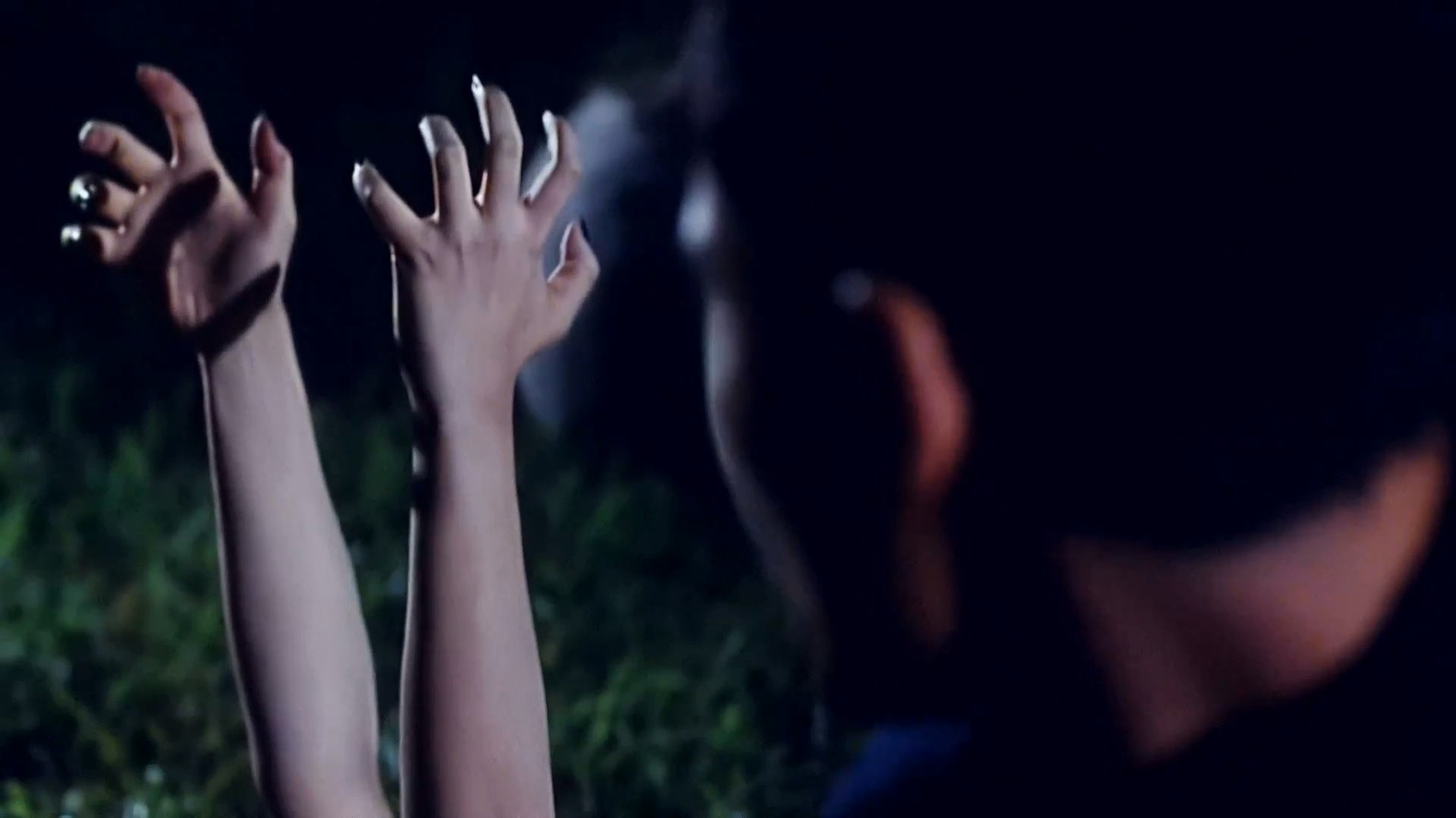Film Database > The Wicked Ghost (San Chuen Lo See)
The Wicked Ghost (San Chuen Lo See)
Director: Hung-Wah Leung
Writer: Hung-Wah Leung
Cast: Gabriel Harrison (as Ming), Francis Ng (as Mr. Mo), Gigi Lai (as Cessy), Tat Lui (as Lee keung), Phoebe Chow (as Chu Renmei)
Genre: Horror
Year of Release: 1999
Country of Origin: Hong Kong
Language: Cantonese
Writer: Hung-Wah Leung
Cast: Gabriel Harrison (as Ming), Francis Ng (as Mr. Mo), Gigi Lai (as Cessy), Tat Lui (as Lee keung), Phoebe Chow (as Chu Renmei)
Genre: Horror
Year of Release: 1999
Country of Origin: Hong Kong
Language: Cantonese
Synopsis
Synopsis: Four youngsters playing the game of ‘Contacting Ghosts’. One of them sees a ghost with long hair and the horror begins.
Gallery (1)
Comments (3)
Share horrific details here...
fantasmamalvado0 (💔1)
›› 1 year ago
Chu Renmei once lived in a village in HK, Republic of China, in the early 20th Century, whereas “The Wicked Ghost,” the film that featured her absent presence, was released at the end of the same century—two years after HK was handed from British colonisation back to the People’s Republic of China, as a so-called “special administrative region.” The film was set in its contemporary time, in HK, and then a few years later its pirated copy inscribed an eerie, everlasting remark on a mainland kid’s muffled memory. —The above recount seems irrelevant. You could take it as an ambiguous instantiation of a sense of anachronism, i.e., a politically-tainted prerequisite loss of the right to nostalgia. “Since the founding of the People’s Republic of China, it is not allowed to become supernatural”. It is a meme, and memes are always true.
The least that I could do is to pretend to recall what exactly happened to five-(or ten-)year-old me staying up all night on a Chinese New Year’s Eve, watching “The Wicked Ghost” with my two cousins. Our energy could have been drained already, after watching two other horrors successively. Yet we had to keep up with our annual ritual of horror marathon while our parents were busy at the mahjong table. At dawn, I could have still held on to Chu Renmei’s waned breath from the unfathomable pitch-darkness that is her mouth, being incessantly cut off by the sound of mahjong tiles shuffled around amidst the even louder disruption of deafening fireworks. You’d think that this festive backdrop would have diluted whatever horror that lingers around, but if you are familiar with the origin of Chinese New Year—the annual haunting of a monster named Nian—you’d agree that the kids did a good job curating according to the context.
It is May 14, Sunday, 21:55, Rotterdam. I happen to hear fireworks, the occasion of which seems irrelevant.
fantasmamalvado0 (💔2)
›› 1 year ago
She was a Cantonese opera singer, with a name beautiful in the most unapologetic manner. “Chu-楚 Ren-人 Mei-美”—pronounced syllable by syllable—has been sealed in my corpus as an ominous entry. Naming is a prophecy that shapes. In the case of Chinese, you could say that the characters themselves not just evoke but really assume a certain image—or, more precisely, a volume that holds the place for a designated ideal. 人美 assumes a beauty, though the two characters switched around effectively tunes down the coquettishness of such beauty—美人—with a certain “literati” affectation.
It takes an epitome of women to fabricate an archetypical (female) ghost. Note that it still applies when you take the attribute “(female)” away. A ghost is by default female, i.e., a yin subject, whose subjectivity is never self-sustained.
The ghost “Chu Renmei” who sings Cantonese opera is bound to the fading silhouette of her pre-mortem form, the existence of the latter being no less fragile given that it is bound to the sole witness of the kid she once cared for now in his twilight years. The thing is, until a recent, much-belated revisit to the film bored me to the point of embarrassment, Chu Renmei has haunted me not by her appearance, but by a still-cut frame of her least humane (yet arguably most “female”) deed—[01:08:31, as Chu Renmei calls Xiao Qiang, a steel rod falls from the top of a tall building in construction and pierces through the old man’s mouth, leaving his body pinned at a back-bending position.]
The malice of Chu Renmei is a time-bound grudge—a grudge too feminine. Her furious vengeance and her conciliatory forgiveness are not so different from one another, for both are too easily placed into a framework dubbed love too familiar to us fellow women—killing will not dissipate her grudge, and forgiveness would not heal her wounds; in the irrevocable aftermath of “his”—he who remains absent—betrayal and abandonment, her malice is an ambiguous agency pronounced 奈何, an unapologetic sigh. And there is nothing to be done about it.
The film’s original Chinese title—pronounced syllable by syllable—“山-Shan 村-Cun 老-Lao 尸-Shi”, literally means “an old corpse in the mountain village.” The accent (undoubtedly) falls on the last syllable, 尸, corpse. The sloppy official English title of the film, “The Wicked Ghost”—barely a translation—is by no means false, except that it too hastily cast the corpse that Chu Renmei is aside. If Chu Renmei were not bound by the corpse that she is, then despite being an archetypical ghost, she would have betrayed the doctrine of an archetypical horror. With the omission of the continuum “corpse-ghost”, Chu Renmei appears first and foremost as a “living” agent with her pitiful claims.
A note on corpse-ghost: “‘My’ body has always extricated what ‘I’ permanently thrust aside in order to live, until the border that is ‘I’ has nothing left and ‘my entire body’ falls into the other side of the border, the ‘utmost of abjection’. It is no longer I who expel, ‘I’ is expelled. The border has become an object.”[1] If “the corpse (or cadaver: cadere, to fall)” is the border objectified, the caesura it marks out is out of reach of a (strictly speaking) “human” subjectivity. A rupture between the realms of yin and yang, the un-ontologized corpse evades the spatial confines of the realm of yang; instead, it assumes subjectivity in the realm of yin.
Chu Renmei’s horror is not tempered by any medium “exterior” to her. The corpse that she is and its extension (the corpse water) are precisely the means of haunting. On the unmarked burial mounds, a pair of indignant, naked arms stiffly raised. Later, her tomb was destroyed by real estate development and her corpse was dumped at the bottom of a lake; her long, black hair drenched her costume so blue that it becomes almost purple, and the water polluted by the malice of the corpse got into the pipelines of the city, connecting—in the continuity of materiality—the primary site of haunting (the apartment where a group of daredevil youngsters played a ghost-conjuring game) and the secondary site (where the corpse is) that makes the haunting possible, seamlessly.
It is the physicality that sustains the agency and assures the efficacy of Chu Renmei’s haunting. However, this also means that as a corpse-ghost Chu Renmei’s scope of action is constrained geographically. If anything, it might be that how to resolve the physicality/virtuality dichotomy remains a tricky task for many East Asian horror films. (The utmost solidity of the “phantom” in Kiyoshi Kurosawa’s Pulse sets a great example.)
–––
[1] Julia Kristeva, Powers of Horror: An Essay on Abjection, trans. Leon S. Roudiez (New York: Columbia University Press, 1982), 4.
fantasmamalvado0 (💔1)
›› 1 year ago
A scene in the film: a person with yin-yang eyes saw a long-haired female ghost behind his friend’s back. This is a very familiar way of “possession” in East Asian horror films and real-life scenarios alike. The ghost is always behind you, imminently intimate, somewhere at the shoulder or carried on the back. Yet “possession” (附) is inaccurate; the ghost is simply “attached” (依) to the affected person. This attachment entails an invisible volume and an imperceptible weight, the kind of which is often described as an energy of yin. The unfathomable hole—negative but with drowning attraction—in her wide-opened mouth on the poster. I do not have yin-yang eyes, what I “see” is roughly that and only that.
Related Films (5)
Film Database > The Wicked Ghost (San Chuen Lo See)

